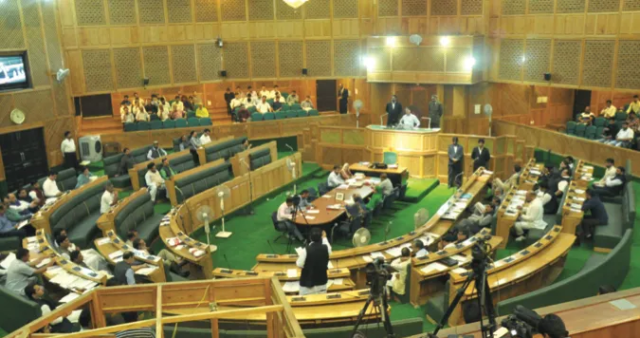Srinagar, Oct 22: The resolution of the People’s Democratic Party (PDP) seeking to hand over custodianship of the J&K Waqf Board to the Mirwaiz Moulvi Muhammad Umar Farooq-led Muttahida Majlis-e-Ulama Jammu and Kashmir (MMU) was among those dropped in the ballot.
The MMU is an umbrella body representing major religious organisations in J&K, both Sunni and Shia.
Its stated role includes promotion of intra-Muslim sectarian harmony, coordination among Ulemas (religious scholars), and custodians of religious institutions.
Given this background, the MMU is viewed as a powerful religious-community body that wields influential moral and social authority across sects in J&K.
The resolution submitted by the PDP proposed handing over the custodianship of the J&K Waqf Board to the MMU.
In effect, this would have meant the MMU taking charge of the Waqf Board’s governance, or perhaps replacing the existing statutory arrangements with institutional control by the MMU.
The matter is significant considering that the Waqf Board controls substantial religious and charitable endowments in J&K.
At the national level, the Waqf (Amendment) Act, 2025, already stirred controversy in J&K and beyond, with the bill seeing an uproar in the Assembly over concerns of religious autonomy.
The J&K Waqf Board is the statutory body tasked with managing the Awqaf (religious endowments) of the Muslim community in J&K.
The origins trace back to Idara Auqaf-i-Islamia.
In August 1973, a large gathering at Hazratbal resolved to transform the body into the “All Jammu and Kashmir Muslim Auqaf Trust”.
In 2003, the Jammu and Kashmir Specified Wakfs and Specified Wakf Properties (Management and Regulation) Ordinance was promulgated, followed by the Act of 2004 converting it into a formal Waqf Board structure.
The Waqf Board oversees shrines, Masjids, Khanqahs (Sufi centres), and other religious-charitable properties.
The PDP resolution seeking to hand over Waqf Board custodianship to MMU, being dropped, is noteworthy.
The development comes at a time when Kashmir’s religious-institution governance is under scrutiny, with the Waqf Board’s role, appointment mechanisms, statutory autonomy, and community trust all under focus.
The Assembly’s private-member ballot process has filtered it out along with many other resolutions with only 7 admitted out of 58.
Out of the 58 Private Member resolutions submitted for the Jammu and Kashmir Legislative Assembly’s Autumn Session that starts on Wednesday, only seven have been admitted following official balloting.
The admitted resolutions include the Establishment of a Law University by Congress MLA from Bandipora, Nizamuddin Bhat; Promotion of Employment by NC MLA from Srigufwara-Bijbehara, Bashir Ahmad Shah (Veeri); Compensation under NDRF by Bharatiya Janata Party (BJP) MLA from Udhampur West, Pawan Gupta; Improvement of Infrastructure by BJP MLA from Bishnah, Rajeev Bhagat; Implementation of Panchayati Raj Rules by independent MLA from Thanamandi, Muzaffar Iqbal Khan; Regularisation of Daily Wagers by NC MLA from Poonch-Haveli, Aijaz Jan, and Allotment of Land by MLA from Chenani-Ghordi, Balwant Singh Mankotia.
The balloting process determines which private-member resolutions will go to detailed discussion in the forthcoming session.








